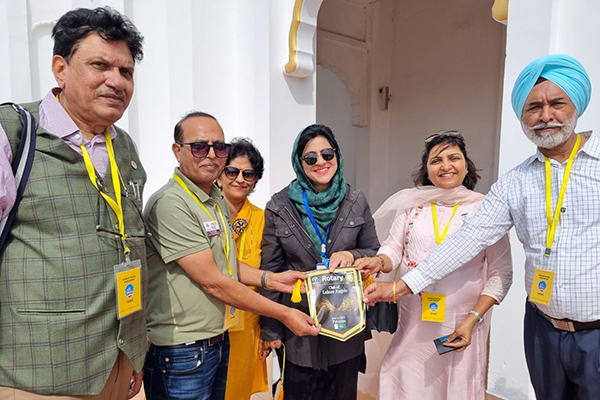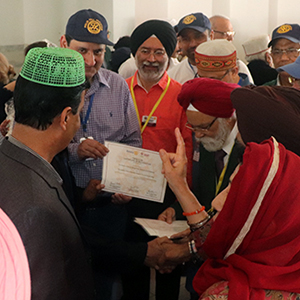
By Amrit Pal Singh, District 3080 assistant governor and past president of the Rotary Club of Chandigarh, India
I was thrilled recently to help coordinate a remarkable meeting between Rotary members in India and Pakistan that promoted peace and understanding between our two countries. On 4 March, more than 100 Rotary members, friends, and family from India and another 100-plus from Pakistan met together at a sacred site in Pakistan. The goodwill meeting sought to break down some of the historic barriers of animosity between our countries and unite us in the spirit of Rotary fellowship.
Kartarpur Sahib in Pakistan is a sacred site for Sikhs with immense religious and spiritual value to both Indians and Pakistanis. Guru Nanak Dev, the first Sikh guru, is believed to have spent the last 18 years of his life there. The complex on the east bank of the Ravi River is massive and well-maintained. Its beauty is overwhelming. Strict immigration and customs rules are in place for people from India making a pilgrimage to visit Kartarpur. Access is through a narrow corridor. Fortunately, we were able to secure all the necessary permissions to make it happen.
In the reception area that served as our venue, old friends hugged while new friends shook hands and got to know each other. Almost everyone was busy with their cameras, taking photos to capture the moment. Members exchanged club banners and presented Rotary pins. Some participants gifted each other with boxes of treats.
Because Pakistan is still a polio-endemic country, Rotary members from India were required to receive polio drops in the Indian immigration building before crossing the border. The person administering the drops saw my Rotary pin and said excitedly, “Rotarians have been giving these drops to the children of our country for so many years. I am so proud to return the favor today.” It was a touching moment.
The idea originated with past governors Madhukar Malhotra of District 3080 (India) and Shezad Ahmed of District 3272 (Pakistan), both directors of the Indus Peace Park Society. They proposed a meeting between members of the Rotary Clubs of Chandigarh and Lahore Garrison. But as an assistant governor, I expanded the idea to include more clubs from the two districts.

Our focus was also on creating twin club relationships before the trip so that members of the paired clubs could meet. I had help from Anil Ghai, a Rotary member from Delhi who is also an Indus Peace Park director. Our efforts resulted in eight clubs from Chandigarh, Sahibzada Ajit Singh Nagar, Shimla, and Parwanoo, India, forming twin club relationships with clubs in Lahore and Faisalabad, Pakistan, in February.
On the day of the event, we had members from 16 different clubs, including many current, past, and future district leaders and club presidents. Ved Parkash Kalta, our district governor, was not able to attend due to a previous commitment to training events but supported and encouraged attendance. Twin club certificates were signed, and memorandums of understanding exchanged. We discussed future opportunities to follow up on the goodwill meeting and collaborate on future service projects.
All too soon, it was time to say goodbye. Many felt a sense of fulfillment for having made the journey as well as sadness at having to leave. Invitations were extended to visit each other in the future. Since our return, two of our clubs in India have had joint meetings over Zoom with their twin clubs in Pakistan. The Rotary Club of Chandigarh has also pledged to work with clubs in Pakistan to bring children with congenital heart disease to India for free heart surgeries.
As Rotarians, we can help make this world a better place through our actions.
https://blog.rotary.org/2023/05/02/rotarians-in-india-pakistan-promote-peace-at-sacred-site/

